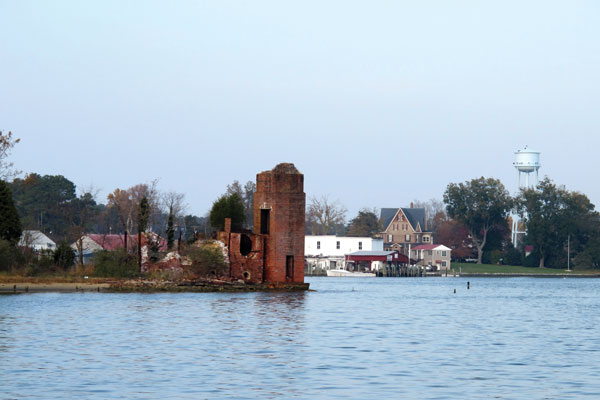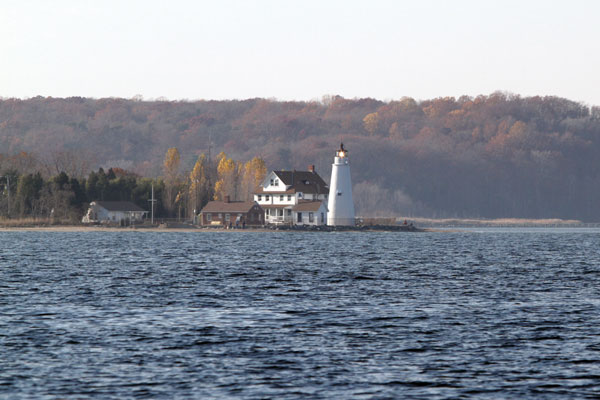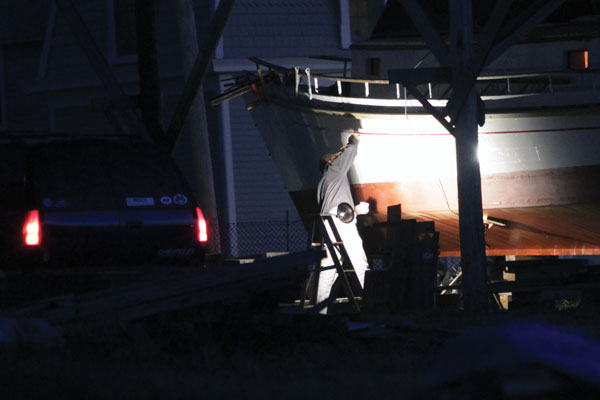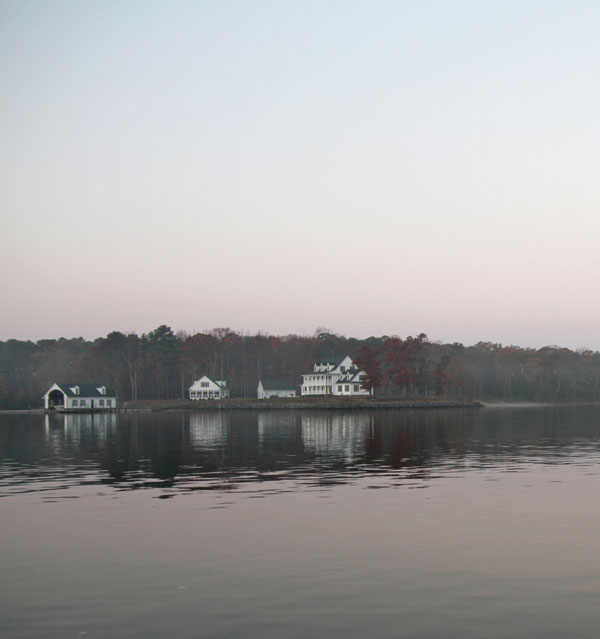Mitch has been kind enough to let us republish a recent series of articles he wrote that are at the Observer News. I have included a link back to the original article on the Observer News website at the bottom of the article here.
Sailing in through the out door

Reedville, Virginia, is a quiet community on a creek just off the Chesapeake Bay. MITCH TRAPHAGEN photos
The quiet in the cabin echoes. All of the activity and the excitement of preparing the boat with Michelle are now recent memories. I can still feel the energy but I am alone. In the time it will take Michelle to drive a thousand miles back to Tampa Bay, I can, at best, make 100 miles under sail. This is not a journey for the impatient. I am struggling to learn patience. But first, I must overcome the quiet echoes in the cabin.
Gale warnings for the Chesapeake Bay delayed my departure for the beginning of the protected waters of the Intracoastal Waterway in Norfolk, Virginia. The bay doesn’t relinquish her grip easily — especially for fools who tempt her by leaving late in the season.
Since the day I bought this boat I have been sailing in through the out door. In other words, I have been moving in the opposite direction of the normal cruising flow. Each year hundreds of people sail their boats north for the summer and south for the winter in a never-ending quest for 75 degrees in temperature. When the days grow short and cool in the north, the cruising fleet, made up of everyone from retired couples on immaculate yachts to young drop-outs on small boats experiencing adventure before becoming tied to mortgages, point their bows south for Florida, the Bahamas and the Caribbean. Months later when the summer heat and the threat of hurricanes rise, they sail north. For most of these cruisers, the ICW is the nautical equivalent to Interstate 95.
When I launched the boat at Cape Cod and sailed south, the cruising fleet was sailing north. While underway, I would often pass a dozen or more northbound sailboats while I continued in the opposite direction. Now at the Cambridge Yacht Maintenance boatyard, I spent a week busily preparing my boat for extended cruising by adding equipment and giving the bottom a fresh coat of paint. All the while, the workers in the yard were busily hauling out one boat after another to store for the winter on land. I have been moving in the opposite direction of most boaters since last year, but upon arrival to Norfolk that will change. Though I am several weeks behind the bulk of the southbound fleet, I will, for the first time, be moving in the customary direction.

The Cove Point Lighthouse near Solomons is the oldest working lighthouse in Maryland. It is owned by the Calvert Marine Museum but is still operated by the U.S. Coast Guard.
My wife Michelle flew in to pick up my car and we decided to let a perfect weather window slip away in favor of spending an extra day together. The manager at Cambridge Yacht Maintenance boatyard did not express impatience or concern about my extended stay. Instead she told me that I had made the right choice.
When the day of departure finally arrived, my engine lost power just a mile out of the marina. I had witnessed the yard employees scramble to rescue boats with engine troubles and I took comfort in the fact that help was just a radio or cell phone call away. As I limped back to the slip, I wasn’t asked to relinquish the valuable dock space (for which they never did charge me) but instead was put in touch with a diesel mechanic who arrived within an hour. When the next day was spent replacing parts, I was only asked how things were going. I’ve learned that when people ask such questions here, it is because they really want to know. They sincerely care.
For the people in this boatyard, their jobs are a source of good and honest labor. With their muscles and their minds, they produce something worthwhile and valuable for the boats in their care, many of which are the fruits of years of hard work. Some of the owners are in the autumn of their lives and their boats are almost as important to them as the children who have long-since moved away to start families of their own. Each boat, regardless of size or pedigree, is treated with care and respect. In the boatyard, jobs cannot be outsourced to a foreign nation, nor can they easily be turned over to younger, less-expensive workers. The employees here learned through time and experience, as will those who come after them.

As winter approaches in Maryland, the days get shorter but work still needs to get done on boats. Cambridge is all about boats.
For me, the false starts and waiting for parts were learning experiences on many levels, not the least of which was learning patience. With the unexpected free time, I was able to watch the yard crew winterize and shrink-wrap large boats. It is an amazing process — and one that requires a high level of patience from the person doing the shrink-wrapping. I saw the testing of an experimental cargo unit that may someday serve our military by sending fuel and supplies in from offshore ships to land-based troops as autonomous, self-powered cargo vessels. The odd-looking, small cargo vessels are unmanned, so no lives are risked through exposure to enemy fire while landing.
That afternoon, I saw loons swimming and diving in the harbor. The Chesapeake is a familiar home to these most ancient of birds and fossils of loons dating back to the Pleistocene Epoch have been found in Maryland. The loon is the state bird of my home state of Minnesota and seeing them here was like seeing old friends and a reminder that the world is indeed a small, interconnected place. I also had the opportunity to meet Peter, a fellow singlehanded sailor, who will be heading south from the Chesapeake on his own for the first time. Peter gave me a proper cruising bucket to replace one that I had accidentally destroyed during the chaos of my false start a few days prior.
Although the weather and water were challenging at times, leaving the Chesapeake behind will be a bittersweet parting. It is a fabled cruising ground of picturesque beauty, brimming with history, and a place of friendly and generous people. More so than many places, it seems that people here know that a smile for a stranger costs nothing, yet has immeasurable value. One could call this place “home”.
My extended stay gave me an opportunity to examine the need to feel as though every waking moment should be filled with something productive. Sometimes the best use of time is to learn to be still; to practice patience; to appreciate the moment and the people and things around you. My newfound, infant-stage, Zen-and-the-Art-of-Sailboat-Maintenance attitude also comes with a new appreciation for what has made this experience possible: my wife and my job. As a result, my patience comes with a side of pragmatism telling me to get things in gear and get home.
Apparently, God was less than impressed with my rationalizations. It seemed all of the lessons in waiting for weather and waiting for boat parts weren’t getting through my thick skull. So God sent Alicia, a two-and-a-half-foot tall pixie with a plastic lizard.
On my last full day in Cambridge, I took a county bus to a Walmart store to restock some supplies before sailing. The bus meandered through town, turning the 10-minute trip into a 45-minute odyssey. Being newly patient, I was interested in the opportunity to see new parts of this beautiful and fascinating community. With my shopping completed, I waited outside the store for a return bus. Two showed up at the same time. One driver told me I had a 20-minute wait, the other driver told me she’ll take me where I need to go, so I told her my stop was near the hospital and jumped into a seat on the empty bus. Within minutes, we were a few blocks from my stop. But the driver kept going down the highway, across a bridge and into the next county. I considered asking her if she stole the bus and was on the run; but decided to be still and see how things played out. Finally, after nearly 15 miles, she stopped at a hospital in a different town.
This is where Alicia comes in. It was afternoon and the county buses became school buses for the children attending charter schools. The only way I could get back was to wait at an elementary school with the kids and then ride their route. I was stuffed into a seat with my groceries as the kids boarded. Before long, I felt a tug at my sleeve.
“I’m Alicia, what’s your name?” The young girl asked.
Thus began a true odyssey in which Alicia and a young man in a six-inch necktie competed at who could talk the most to the disheveled stranger on their school bus — Alicia with tugs on my sleeve and the young man by repeatedly asking, “Guess what?”. I sat back and enjoyed the ride learning about how Scoobie Doo spends his summers in Florida, a new Battleship game, and Alicia’s plastic lizard that sleeps on the bus but stays awake inside her backpack (which was roughly half her size) during school.
Three hours after I left, I returned to the boat feeling better about pretty much everything in life. On the other hand, I also realized that an entire busload of two-foot tall children managed to find the right bus — something I failed to do. And yeah, I’m going to sail a boat from Maryland to Florida.
The next day I finally departed Cambridge. Two miles from the marina, the engine died. After a few moments of panic, the engine started and kept running (for the most part) until it finally delivered me to a small coastal community in Virginia named Reedville. During the sail, three boats were headed south along with me. Finally, I am pointed in the right direction. On the last day of my 47th year, I enjoyed the hospitality and seafood at a restaurant in Reedville. It seems the cabin is still too quiet.
http://www.theobservernews.com/news/front-page-news/638-sailing-in-through-the-out-door.html


Recent Comments